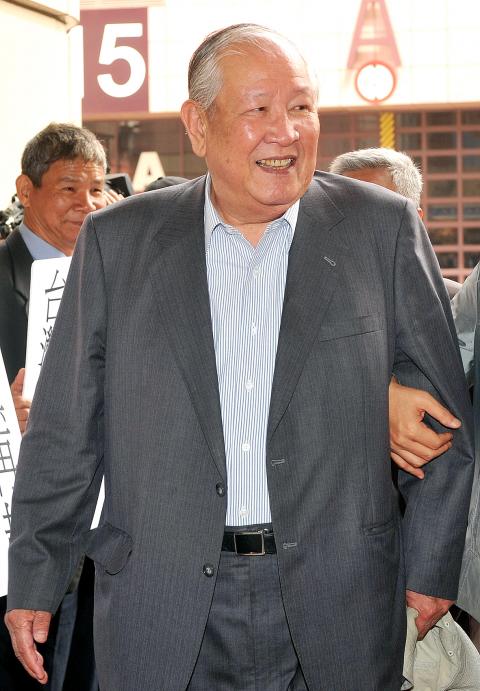Taiwan independence pioneer and World United Formosans for Independence (WUFI) chairman Ng Chiau-tong (黃昭堂) died yesterday from complications arising from sinus surgery. He was 79.
Ng was rushed to the National Taiwan University (NTU) Hospital in Taipei after suffering heart failure halfway through surgery at the Koo Foundation Sun Yat-Sen Cancer Center in Taipei earlier in the day.
Ng died of heart failure at around 11am, WUFI secretary--general Wang Kan-hou (王康厚) said.

Photo: Chien Jung-fong, Taipei Times
Taiwan Nation Alliance convener Yao Chia-wen (姚嘉文) said Ng’s death was totally unexpected.
“The Democratic Progressive Party [DPP] was grief-stricken to learn about Ng’s passing. He has devoted his whole life to Taiwan’s democracy and freedom and his spirit will live with us forever and call on us to fight for the well-being of the next generation. May he rest in peace,” DPP Chairperson Tsai Ing-wen (蔡英文) told reporters at a campaign stop before she visited Ng’s family at the hospital.
Ng’s passing is a “great loss for the Taiwan independence movement,” said Lee Yeng-chyh (李永熾), a history professor.
“Ng has never wavered in his support for Taiwan’s independence. We should remember him for his determination, perseverance and his love for Taiwan,” DPP Legislator Tsai Huang-liang (蔡煌瑯) said.
Tainan-born Ng was known for his decades of dedication to the independence movement. He was also one of the main organizers of the 228 Hand-in-Hand rally, widely seen as a crucial event contributing to former president Chen Shui-bian’s (陳水扁) re-election, when more than 1 million Taiwanese formed a human chain across the west coast on Feb. 28, 2004.
Born in 1932 during the Japanese colonial era, Ng went to Japan for further study after graduating from NTU in 1958. He began participating in the independence movement the following year when he was working on his master’s degree at then-Tokyo Imperial University.
He founded the Taiwan Youth Society, the forerunner of today’s WUFI Japan office, in 1960 in Tokyo. That act led to him being placed on a Chinese Nationalist Party (KMT) government blacklist, thereby barring him from returning to Taiwan.
Ng, who did not return to Taiwan until 1992, had served as WUFI chairman since 1995 and as a presidential adviser during Chen’s DPP administration.
A self-proclaimed supporter of “swift independence” when he was younger, Ng told the Taipei Times in an interview in August that his eventual goal would be “removing the ROC [Republic of China] political system, which was forced upon Taiwanese by the regime of Chiang Kai-shek (蔣介石) after the end of World War II.”
However, he later adopted a more moderate approach, saying that the removal of the ROC system would take time and could not occur without a healthy combination of domestic political development, global trends and, most of all, the consensus and will of the public.
“The ROC is like a cap on the top of our head. If it’s rainy, we’ll have to wear it for now, but we are waiting for a sunny day to take it off,” he said in the interview. “I am very optimistic. The Taiwan independence movement will succeed someday.”

Right-wing political scientist Laura Fernandez on Sunday won Costa Rica’s presidential election by a landslide, after promising to crack down on rising violence linked to the cocaine trade. Fernandez’s nearest rival, economist Alvaro Ramos, conceded defeat as results showed the ruling party far exceeding the threshold of 40 percent needed to avoid a runoff. With 94 percent of polling stations counted, the political heir of outgoing Costa Rican President Rodrigo Chaves had captured 48.3 percent of the vote compared with Ramos’ 33.4 percent, the Supreme Electoral Tribunal said. As soon as the first results were announced, members of Fernandez’s Sovereign People’s Party

MORE RESPONSIBILITY: Draftees would be expected to fight alongside professional soldiers, likely requiring the transformation of some training brigades into combat units The armed forces are to start incorporating new conscripts into combined arms brigades this year to enhance combat readiness, the Executive Yuan’s latest policy report said. The new policy would affect Taiwanese men entering the military for their compulsory service, which was extended to one year under reforms by then-president Tsai Ing-wen (蔡英文) in 2022. The conscripts would be trained to operate machine guns, uncrewed aerial vehicles, anti-tank guided missile launchers and Stinger air defense systems, the report said, adding that the basic training would be lengthened to eight weeks. After basic training, conscripts would be sorted into infantry battalions that would take

EMERGING FIELDS: The Chinese president said that the two countries would explore cooperation in green technology, the digital economy and artificial intelligence Chinese President Xi Jinping (習近平) yesterday called for an “equal and orderly multipolar world” in the face of “unilateral bullying,” in an apparent jab at the US. Xi was speaking during talks in Beijing with Uruguayan President Yamandu Orsi, the first South American leader to visit China since US special forces captured then-Venezuelan president Nicolas Maduro last month — an operation that Beijing condemned as a violation of sovereignty. Orsi follows a slew of leaders to have visited China seeking to boost ties with the world’s second-largest economy to hedge against US President Donald Trump’s increasingly unpredictable administration. “The international situation is fraught

GROWING AMBITIONS: The scale and tempo of the operations show that the Strait has become the core theater for China to expand its security interests, the report said Chinese military aircraft incursions around Taiwan have surged nearly 15-fold over the past five years, according to a report released yesterday by the Democratic Progressive Party’s (DPP) Department of China Affairs. Sorties in the Taiwan Strait were previously irregular, totaling 380 in 2020, but have since evolved into routine operations, the report showed. “This demonstrates that the Taiwan Strait has become both the starting point and testing ground for Beijing’s expansionist ambitions,” it said. Driven by military expansionism, China is systematically pursuing actions aimed at altering the regional “status quo,” the department said, adding that Taiwan represents the most critical link in China’s